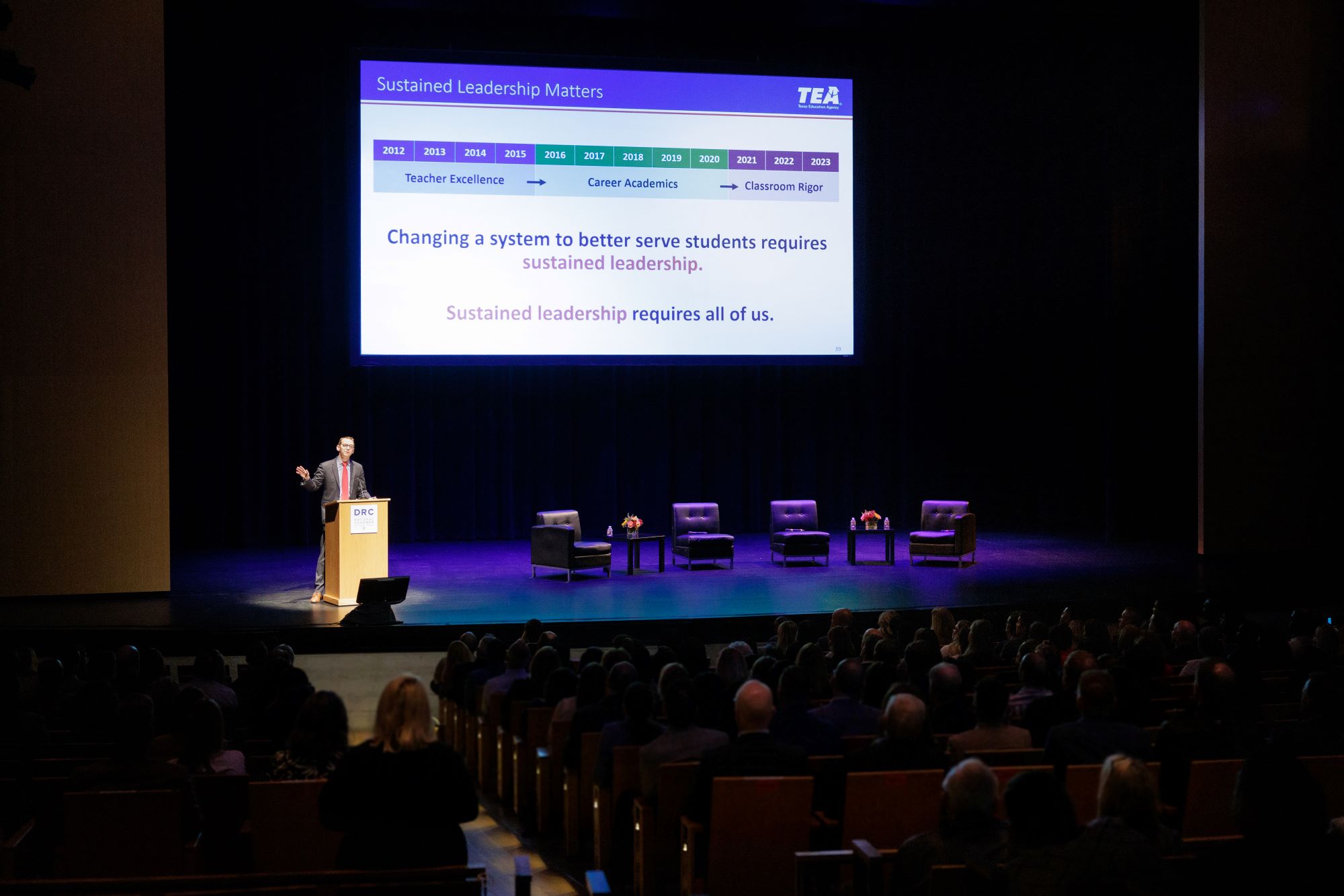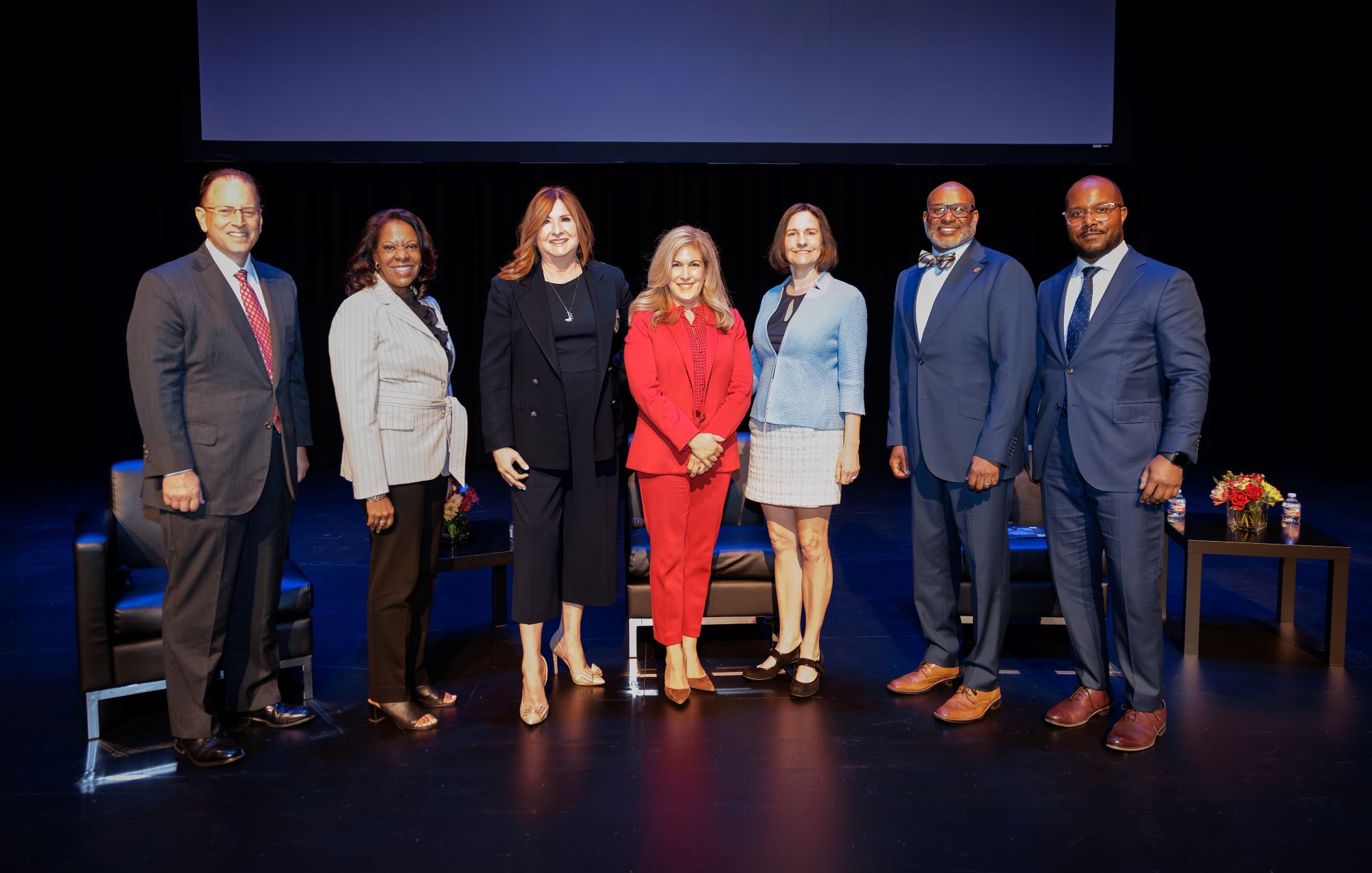By Catie George, Manager, Communications and Storytelling
The Dallas Regional Chamber (DRC) hosted its annual State of Public Education, presented by Toyota Motor North America and Wells Fargo, Tuesday, Sept. 19, at the Moody Performance Hall. The event engaged Dallas Region business leaders with key public education topics.
“A high-quality education is foundational to achieving a fulfilling life and career, and our public schools are essential to that pipeline,” said Angela Farley, DRC CFO and COO. “That’s why the DRC is a proud partner and advocate for public education and why our team works so closely with school districts throughout the region that work hard every day to prepare our students for college, career, and military readiness.”

Texas Commissioner of Education Mike Morath served as the event’s keynote speaker. In his presentation, Morath emphasized the importance of public education for the more than five million children in Texas who benefit from it.
“We want all of our children to be successful in our system of public education so that after they graduate, they are prepared for whatever journey they wish to pursue in life, be that directly into college or directly in the workforce, into the military, whatever that is. And when we say all, we legitimately mean all,” said Morath. “We don’t mean unless you are born in an inner city, unless you are born in rural Texas, unless you are Black or brown or you come from a household that doesn’t speak English, literally. All children need to be prepared for success. This is the unifying mission of public education.”
The event also included a panel discussion between three regional superintendents, in which they concurred that ensuring students graduate from the public education system ready to enter and thrive in life after high school is the highest priority.
“We want our kids to graduate with options. We want them to graduate with an associate degree, a high school diploma, a STEM endorsement, or an industry-based certification because the more options you have, the better off you are with understanding what you want to do for the rest of your life,” said Cedar Hill ISD Superintendent Dr. Gerald Hudson. “If we can help you find your passion while you’re in high school, then you’re going to enjoy the rest of your life… So, we want to make sure our kids understand what opportunities are out there for them while they still have that playing field.”
Morath’s keynote focused on the most pressing issues facing Texas’ public schools, including strategies for hiring and retaining quality teachers.
“The teacher in the classroom is the single most important in-school factor that affects student outcomes,” said Morath. “There is no way that we materially improve these numbers without improving the way that we support and retain our teachers. It comes down to two key things: pay and working conditions.”
Dallas ISD Superintendent Dr. Stephanie Elizalde concurred.
“If we don’t have effective teachers, we cannot get our work done,” said Elizalde.
By introducing a performance-based pay system for teachers, Dallas ISD has closed its teacher turnover gap with the state despite a significantly higher rate of student poverty. In 2013-14, the teacher turnover rate in Dallas ISD exceeded the state’s rate by more than 5 percentage-points. During the height of the pandemic during the 2020-21 school year, statewide teacher turnover exceeded attrition rates in Dallas ISD.
“It is the only school system in the state of Texas to date that has made this change, where not everybody gets a raise every year. And instead, pay is entirely driven based upon performance,” said Morath. “And as a result, Dallas has seen a significant reduction in turnover. Their teachers are sticking around a lot longer than they used to. This is better for our teachers, but the thing is, it’s a lot better for our kids.”
A study by the National Bureau of Economic Research, cited by Morath, bears this out. Compared to its peer districts, who have seen stable student achievement since 2015 – when Dallas’ performance-based compensation system was introduced – outcomes in Dallas ISD have steadily improved.
Morath also shared that reading levels have recovered to and largely exceed pre-pandemic levels, but there is still a way to go in math.
“We say that all children, when we support them properly, can learn and achieve at high levels,” said Morath. “Schools are making improvement, but this is hard work… it’s the most important work that we do, and we’ve got to do it right.”

Dallas schools’ new approach to graduating kids with their high school diploma, work experience, and their associate degree was also praised by the commissioner.
“Dallas is leading the nation in this transformation towards career readiness,” said Morath. “We have seen a quadrupling in the number of children statewide that are graduating high school with an associate degree in the state of Texas. This is a huge, life-changing opportunity for so many kids.”
Dr. Theresa Williams, Superintendent of Plano ISD, shared that, while there is always room for improvement, it’s important to recognize the strides being made in Dallas Region’s public schools.
“We welcome rigor. That’s what it’s all about. And we want great learning environments for our kids,” said Williams. “Our teachers will do whatever they need to do to ensure that our kids are getting what they need, but we need to recognize the hard work and celebrate the great accomplishments that our kids are making.”
The State of Public Education was presented by Toyota Motor North America and Wells Fargo. Dallas College, Oncor, and The Commit Partnership also contributed as silver sponsors to this event.
If you want to learn more about the DRC’s work in public education, visit our website.